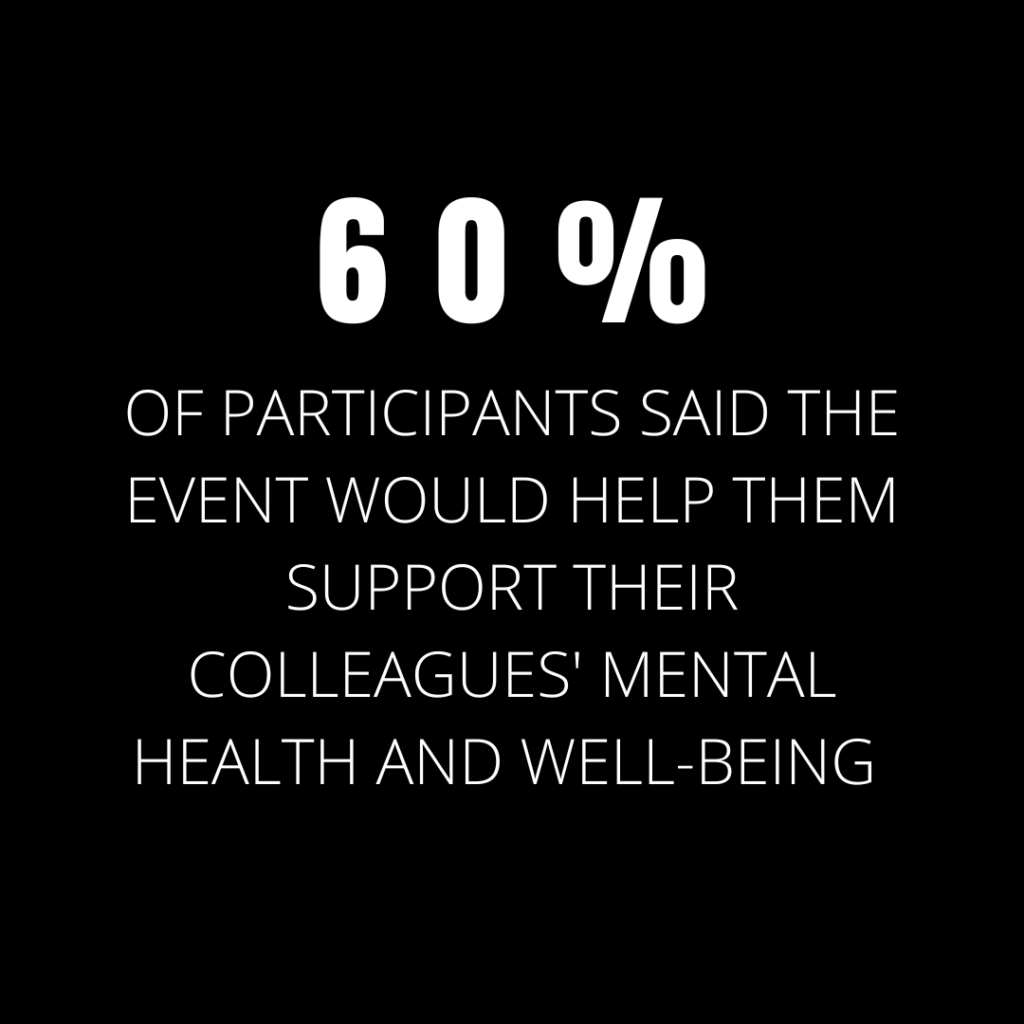Over ⅓ of ethnic minority participants said they felt their organisation did very little or not enough to support mental health and well-being.
We know that ethnic minority employees and Race Network leaders have had to experience so many difficult and often traumatic experiences, especially in the last couple of years, leading to a serious impact on their wellbeing and at times resulting in burn out.
To help address this as part of our Race Network Leads and Future Leads event series we hosted on 19th May 2022, we spoke with expert speakers about looking after mental health and well-being at work.
We chose to dedicate a whole event to this important topic for people with lived experience of racial inequality, the importance was reflected by the received interest from over 350 organisations.
May marked the invaluable Mental Health Awareness Week and here at Race Equality Matters we chose to host this event outside of this week to facilitate attention on this topic as an ongoing priority for organisations. As co-founder of Race Equality Matters, Javed Thomas, told attendees:
“We believe a focus on mental health is important all year long, not just for one week.”
Ongoing issues and events in society often have a heightened impact on the mental health of ethnic minorities, and over two thirds of attendees felt they receive none, not enough or only ‘a little’ mental health support in the workplace.
Research discussed by Alicia Nagar, at Mental Health First Aid (MHFA) England, demonstrated how mental health issues disproportionately impact ethnic minority employees. The 2021 report by Business in the Community, as Alicia explained, found that people of colour were at greater risk of financial insecurity, bereavement, job loss and lower access to care during the Covid-19 pandemic, which are all risks for mental health conditions.
The City Mental Health Alliance report also linked poorer mental health- through feelings of loneliness, not ‘fitting in’ and feeling a need to change their behaviour within the workplace- disproportionately to ethnic minorities in the workplace.
At Race Equality Matters, we want to help organisations and employers change this.
These issues were discussed by our speakers, with lived experience of racial inequality, as they gave expert advice on how to look after your mental health and well-being in the workplace through Race Networks. The speakers included:
- Alicia Nagar (Startwell Delivery Consultant, Mental Health First Aid (MHFA) England)
- Esther Kwan (Head of Covid-19 Inquiry Unit- Department for Levelling Up, Housing & Communities)
- Justin Placide (Head of Home Energy Retrofit Enables and Co-Chair of the FAME Network and Civil Service Race Forum- Department for Business, Energy & Industrial Strategy)
- Natalie Rose (Corporate HSE Advisor, REACH Network Co-Chair, HS2)
Here are 8 tips, based upon expert advice, that your organisation and Race Network could take to support the mental health and well-being of your ethnic minority colleagues:
1. Establish a Race Network.
If your organisation does not have one, a Race Network has clearly been a much needed support space to help employees to discuss lived experience and feelings in the workplace. Successful Race Networks often become integrated into and valued by the wider organisation, meaning members can contribute to change on policy development and an organisation’s structure. Natalie Rose, from HS2, informed attendees that HS2’s Race Network committee offers a ‘constant drip-feed of support’ for their members and the ‘safe spaces’ it has established has had a significant impact on members. Therefore, as Natalie demonstrated, Race Networks can become a safe space to disclose and share personal issues, including that of mental health.

2. Ensure Race Network aims are manageable and realistic.
If you are a Race Network lead, this responsibility can substantially increase your workload. Natalie spoke of the importance of creating manageable aims, alongside your regular ‘day job’, even if this means taking a longer-term approach. She informed attendees that a manageable network strategy “stops us from jumping too far ahead on what we expect from one another” at HS2. Therefore, your aims could consider the budget, resources and time available in your Race Network in order to alleviate pressure and stress on Leads.
3. Share responsibilities between Race Network members.
This was a crucial piece of advice. Having a co-chair and leadership structure within your Race Network can help to reduce the mental and physical ‘heavy lifting’ associated with the Race Network Lead role. This can help manage the workload including the tasks of organisation of and promotion of meetings, as well as the mental toll of the discussions and sharing of lived experiences of racism and racial inequality. Two-thirds of the event’s attendees already had co-chairs within their Race Network and Justin Placide reminded attendees of how helpful sharing leadership roles with a colleague was for him and his well-being. Such personal experience evidences the mentoring and support systems that can be established for the mental health of both Race Network leads and members.
4. Organise group discussions, not just individual ones.
Group discussions, such as Race Equality Matter’s Tea Break Solution and HS2’s ‘Courageous Conversations’, can improve well-being for those involved. Over half of attendees had not attended a group discussion forum within their Race Network, as individual counsel approaches are often more common. Natalie Rose referred to the ‘compassion fatigue’ that many Race Network Leads can experience through regular discussion of difficult experiences and emotions, and alleviating this mental strain is best done through group-based initiatives. Reverse/Reciprocal mentoring, as recommended by Natalie, can also help to reduce this ‘compassion fatigue’ and improve personal mental health (We will have a focus on this later in the year).
5. Be Realistic and balance and prioritise your time.
Protecting your time is a good way to look after mental health. Justin reminded attendees that the responsibilities as a Race Network Lead can eat into time for ‘day work’ and/or self-care. He encouraged other Race Network leads to schedule time in for voluntary work and try hard not to exceed this, in order to maintain a work-life balance. Attendees were told by Justin to ask themselves: “How much time can you truly commit to this role as Network Leader without it impacting on you personally?”.
6. Establish training to support colleagues’ mental health.
Training staff on how to support mental health is important and ensuring representation of ethnic minorities within this is equally as important. As Alicia from Mental Health First Aiders (MHFA) England highlighted, training ought to be culturally sensitive to ensure employees can access mental health support that is contextualised to their lived experience. Training for Race Network members and the wider organisation will skill the workplace to better deal with mental health problems, and MHFA England’s bespoke guidance and training uses an intersectional approach for this.
7. Consider yourself first.
We cannot take care of others unless we are well ourselves.
The most effective Race Network Leads often take care of their own mental health, as well as others. Justin shared the importance of self-awareness and identification of your personal ‘triggers’- that for him linked to time- as this is unique for everyone yet central to individual well-being. Esther Kwan, from the Department for Levelling Up, Housing & Communities, encouraged attendees to structure breaks into their working day (where possible) and find time to practise self-care, such as exercising, reading, socialising or meditation. Whether personal or professional, Esther also spoke of the importance to, “take time to celebrate your wins” and self-reflect.
8. Find resources to share, use and self-educate.
With so many resources on mental health and well-being, finding the ones that are most suitable for your organisation and its demographic is important. Natalie spoke of the importance of utilising internal resources, such as support groups, trained mental health First Aiders and organisation well-being services. External resources, as shown by MHFA England and Race Equality Matters, can also be added to the ‘bank’ of resources to support ethnic minority colleagues’ mental health that has been impacted by lived experiences of racism and racial inequality.
For resources, such as the Tea Break Solution, please download Race Equality Matter’s Solution guides that have been collaboratively created and used by people with lived experience of racism and racial inequality in the workplace.

